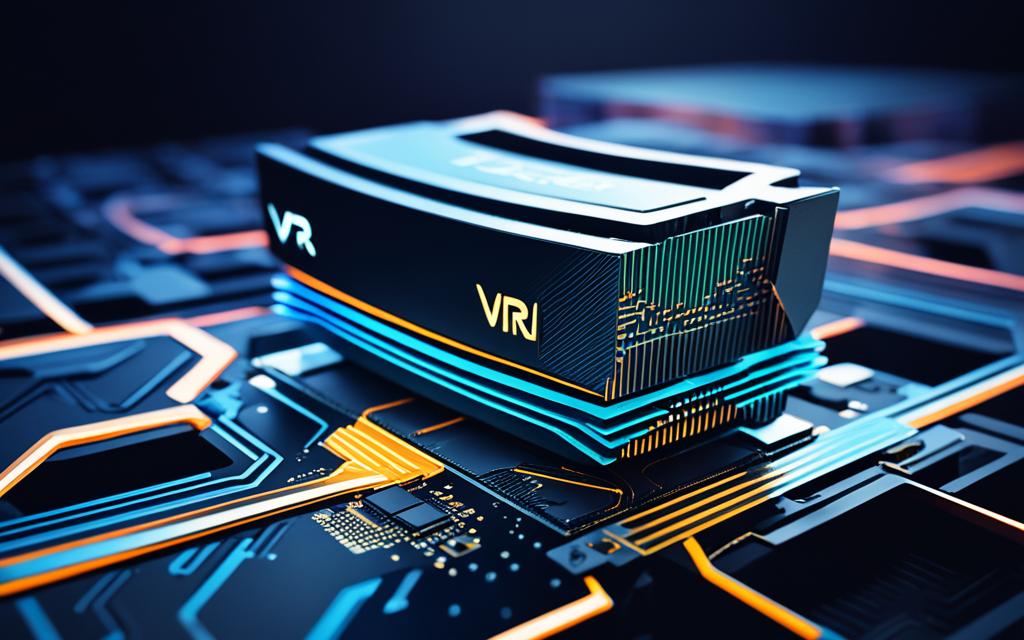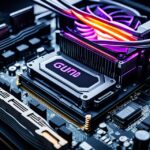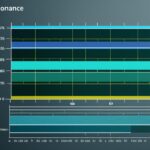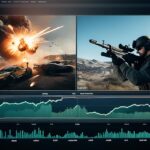Table of Contents
Knowing if VR is harder on the CPU or GPU helps improve VR play. VR games need top-notch graphics, making separate images for each eye. This puts a big load on the GPU to deliver high-quality visuals for both eyes1. High frame rates of 70 to 90 fps are needed to keep the game smooth and players hooked1.
The CPU’s job is to handle game logic and interactions, ensuring steady frame rates2. Balancing the demands between CPU and GPU shapes the VR experience. It’s vital to weigh up both when upgrading gear or making system tweaks.
Key Takeaways
- Both CPU and GPU are key to VR performance, having unique roles.
- Because of the detailed images needed for each eye, the GPU often struggles to keep up.
- Smooth VR gaming needs frame rates between 70 to 90 fps.
- VR works best with CPUs that have high speeds and not too many cores.
- NVIDIA’s GeForce RTX series is top choice for VR gaming.
The Unique Demands of Virtual Reality
Virtual reality is more than just advanced tech. It mixes detailed VR hardware needs, pushing past old computer setups. In immersive worlds, the demands go beyond normal gaming. They need more power and specific hardware to work right.
Understanding VR Hardware Requirements
To get a smooth VR ride, the GPU and CPU’s power is crucial. At the start, you’ll need a GPU like the Nvidia GTX 1060 or AMD Radeon RX 480. These make sure the visuals are sharp and the action doesn’t lag3. For the best results, aim for GPUs like the Nvidia GeForce RTX 3060 or AMD’s Radeon RX 6700 XT3. The CPU has to be strong too, like the Intel Core i5-11400 or AMD Ryzen 5 5600X, for a top-notch experience3.
The Role of Processing Units in VR
In VR, both the GPU and CPU are key. The GPU deals with making the VR worlds look smooth. At the same time, the CPU tackles the commands, keeping up with your moves and the game’s needs4. A good match between them, like having 16GB of RAM, is needed for tough VR tasks3.
| Component | Minimum Requirements | Recommended Specifications |
|---|---|---|
| CPU | Intel Core i5-4590 / AMD Ryzen 5 1500X | Intel Core i5-11400 / AMD Ryzen 5 5600X |
| GPU | Nvidia GTX 1060 / AMD Radeon RX 480 | Nvidia RTX 3060 Ti / AMD Radeon RX 6700 XT |
| Memory (RAM) | 8GB | 16GB+ |
| Operating System | Windows 10 64-bit / Windows 7 SP1 (64bit) | Windows 10 64-bit |
By knowing these specs and how they work together, you can really boost your VR time. It makes sure you’re ready for the new tech challenges.
How VR Performance Differs from Traditional Gaming
Virtual Reality (VR) is more demanding than traditional gaming. VR needs the graphics processing unit (GPU) to create two images at once. This puts more pressure on the hardware compared to standard gaming visuals. VR sites need a fast, smooth frame rate of about 90 frames per second for each eye. This is to make sure the experience is fluid. This requirement pushes the graphics needs in VR further than the typical 60 frames per second aimed for in 2D games5.
Increased Graphic and Processing Needs
VR calls for high-quality graphics and complex effects needing top GPUs. For this, NVIDIA GeForce RTX or AMD Radeon RX series work well, needing at least 8GB of VRAM. Also, a good CPU is important to keep the frame rate steady. Changes in speed can cause discomfort or motion sickness. So, comparing VR to traditional gaming shows a big increase in the need for powerful CPUs and GPUs.
The Challenge of High-Resolution Displays
Creating two separate high-quality 3D images each frame requires strong hardware and high refresh rates for a real feeling of being there. The delay must be less than 20 milliseconds to avoid motion sickness5. If there are performance problems like slow visuals or long wait times, it can ruin the VR experience. As a result, VR makers must make sure their games work well on different systems, from advanced gaming PCs to simple VR headsets5.
How CPU and GPU Impact VR Experiences
Understanding how the CPU and GPU work together is key for top VR performance. The CPU is the core of VR, handling vital tasks for a smooth and interactive experience.
CPU Responsibilities in VR
The CPU ensures steady frame rates and precise head tracking in VR. This is crucial for interactions to feel instant and immersive. Optimal performance often requires at least an Intel Core i76.
System designs usually start with a minimum of 8GB of DDR3 RAM. However, 16GB is recommended for dealing with VR’s demands effectively6.
GPU Demands for Smooth Graphics
The GPU is essential for top-quality graphics in VR. It meets VR’s need for high processing power. An NVIDIA GTX 1070 is often suggested to hit these marks6.
Creating detailed visuals demands great GPU strength, as VR hates laggy frames. The aim is a 90 FPS refresh rate for smooth action1.
Getting the right balance between the CPU and GPU ensures smooth VR gameplay. As VR technology gets better, choosing parts that work well together is key for an optimal experience. For graphics to stay stunning without stressing the CPU, think about future upgrades. Investing in powerful GPUs, such as the 4080, is wise1. Both the CPU and GPU need to work in harmony for VR to truly come alive.
Is VR CPU or GPU Intensive?
Both the CPU and GPU are vital for good VR performance. People often discuss whether to upgrade the CPU or GPU for better VR hardware. Gaming fans believe that high-quality graphics need a strong GPU. At the same time, a powerful CPU handles the complex tasks in games.
The Balance of CPU and GPU Usage
VR gaming tests the limits of CPUs and GPUs. This leads to a crucial debate on finding the right mix. It’s said that VR games need at least 4 CPU cores to perform well, according to VR fans7. This means a capable CPU is key to smooth VR gaming. Enhancing both the CPU and GPU can significantly improve the framerate. Usually, a GPU upgrade is seen as more impactful than boosting the CPU7.
Trade-offs in Hardware Upgrades
Finding the perfect CPU and GPU blend is important when considering VR hardware upgrades. For example, the HTC Vive 1.5 headset can boost performance by 25-50% over lower resolution models like the Pimax 5K XR7. This shows the importance of choosing upgrades based on your VR needs and preferences. Also, modern features like DLSS help increase framerates and improve overall gaming experience. This demonstrates the importance of upgrading both the CPU and GPU for the best VR performance balance7.
Optimising Your Setup for VR
Getting the most out of virtual reality means setting up your hardware right. A well-tuned VR setup brings every detail to life smoothly. This enhances how real everything feels.
Choosing the Right CPU for VR
Finding the perfect CPU for VR is crucial. The Intel Core i7-13700K and AMD Ryzen 7 7700X are top picks. They have high clock speeds and handle VR tasks well. A strong CPU looks after background tasks to make real-time VR better. This includes things like physics and AI, improving how the system works8.
More cores in a CPU mean tasks get shared out better. This stops the system from getting clogged and slowing down the action8.
Selecting the Best GPU for Immersive Experiences
The GPU choice is also key for the best VR experience. Nvidia’s RTX 4080 and 4090 GPUs are great because they can handle high-quality graphics fast. Quick refresh rates keep the VR world smooth8. If your GPU isn’t strong enough, the visuals suffer and it can ruin the immersion8.
To boost your GPU’s performance, always update its drivers. Set Power Management Mode to “Prefer Maximum Performance”9. Choose “High Performance” in power options for steady gaming9. Closing programs you don’t need and using Windows Game Mode helps free up your system for VR9.
| VR Headset | Recommended GPU | Recommended CPU | Memory |
|---|---|---|---|
| Oculus Rift S | NVIDIA GTX 1060 (6GB) / AMD RX 480 | Intel i5-4590 / AMD Ryzen 5 1500X | 8GB+ |
| Valve Index | NVIDIA GTX 1070 / AMD RX 580 | Intel i5-7500 / AMD Ryzen 5 1600 | 12GB+ |
| HTC Vive 1 | NVIDIA GTX 1060 (6GB) / AMD RX 480 | Intel i5-4590 / AMD FX 8350 | 4GB+ |
| HP Reverb G1 and G2 | NVIDIA GTX 1080 / AMD RX 5700 | Intel Core i5, i7 / AMD Ryzen 5 | 8GB+ |
By knowing these details and choosing the right CPU and GPU, you’ll set up your VR for the best performance. This means amazing visuals that feel like real life.
Conclusion
When we explore if VR demands more from the CPU or the GPU, we find a delicate balance is essential. The GPU often faces the bigger challenge, as it must render top-notch graphics and keep refresh rates high for an engrossing experience. Yet, the CPU’s role in managing essential VR app processes cannot be overlooked8. This overview highlights the importance of a strong hardware setup. It ensures all parts work well together, avoiding low frames and bad image quality that can ruin VR fun1011.
Anyone starting with VR needs to know what hardware they require. They might consider pairing strong GPUs, like the GeForce GTX 1080 Ti, with high-performing CPUs for peak results11. As technology evolves, staying updated on CPU and GPU advancements is key8. To truly enjoy VR to its fullest, both the CPU and GPU must work in harmony, opening doors to exciting virtual worlds.
FAQ
Is VR more demanding on CPU or GPU?
VR needs the GPU for high-quality visuals and quick frame rates. Yet, the CPU is also key for running the game smoothly.
What are the unique hardware requirements for virtual reality?
VR requires clear displays (about 2500 x 2000 pixels per eye) and a strong GPU for 90 FPS. The CPU deals with user inputs and AI tasks, supporting the system.
How does VR performance differ from traditional gaming?
Unlike regular gaming, VR requires rendering two views at once, putting extra pressure on the GPU. Its graphic needs are higher, making the experience more immersive.
What responsibilities does the CPU have in VR?
In VR, the CPU keeps the frame rate steady, tracks head movements, and manages interactions. Good CPU performance helps avoid problems like motion sickness.
What demands are placed on the GPU for a smooth VR experience?
The GPU must provide detailed visuals at the needed resolutions and refresh rates for VR. It ensures the rendering of visuals is quick, which is vital for immersion.
How can I balance CPU and GPU performance for VR?
To balance, choose high-quality CPU and GPU. This prevents one from limiting the other, especially in complex VR games.
What should I consider when choosing a CPU for VR?
Look for CPUs with fast speeds and high performance, like the Intel Core i7-13700K or the AMD Ryzen 7 7700X. They can meet VR’s demands well.
Which GPU is recommended for immersive VR experiences?
The NVIDIA RTX series is best for VR, thanks to its ability to handle high resolutions and maintain smooth refresh rates. This makes the VR experience seamless.
Source Links
- https://forums.flightsimulator.com/t/how-cpu-intensive-is-vr/631109 – How CPU intensive is VR?
- https://www.pugetsystems.com/solutions/more-workstations/virtual-reality/hardware-recommendations/ – Hardware Recommendations
- https://computercity.com/hardware/vr/vr-pc-hardware-requirements – VR PC Hardware Requirements: Minimum and Recommended Specs – ComputerCity
- https://www.nvidia.com/en-gb/geforce/technologies/vr/ – Great VR Requires a Great GPU
- https://www.linkedin.com/pulse/how-handle-performance-optimization-vr-development-znanye – How to Handle Performance Optimization in VR Development?
- https://www.techcrates.com/build-your-vr-computer-for-high-end-gaming/ – How Do You Build Your VR Computer For High-End Gaming?
- https://haxor.no/en/article/cpu-vs-gpu-for-vr – CPU vs GPU for VR | haxor.no
- https://www.techylop.com/is-vr-cpu-or-gpu-intensive/ – Is VR CPU Or GPU Intensive – Gain Your Knowledge In 2024!
- https://www.toolify.ai/gpts/maximize-your-vr-experience-with-the-ultimate-performance-guide-303209 – Maximize Your VR Experience with the Ultimate Performance Guide
- https://forums.flightsimulator.com/t/do-expensive-cpus-and-gpus-pay-off-in-vr/583771 – Do expensive CPU’s and GPU’s pay off in VR?
- https://www.tomshardware.com/reviews/oculus-rift-vr-cpu-performance,5215-13.html – CPU Performance In VR: 11 Games Benchmarked












